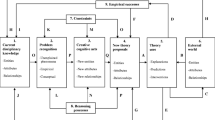Abstract
We study a simple game theoretic model of information transfer which we consider to be a baseline model for capturing strategic aspects of epistemological questions. In particular, we focus on the question whether simple learning rules lead to an efficient transfer of information. We find that reinforcement learning, which is based exclusively on payoff experiences, is inadequate to generate efficient networks of information transfer. Fictitious play, the game theoretic counterpart to Carnapian inductive logic and a more sophisticated kind of learning, suffices to produce efficiency in information transfer.
Similar content being viewed by others
References
Argiento, R., R. Pemantle, B. Skyrms, and S. Volkov, ‘Learning to Signal: Analysis of a Micro Level Reinforcement Model’, Stochastic Processes and their Applications (forthcoming).
Bala, V., and S. Goyal, ‘A Noncooperative Model of Network Formation’, Econometrica 68 (2000), 1181–1129.
Beggs, A. W., ‘On the Convergence of Reinforcement Learning’, Journal of Economic Theory 122 (2005), 1–36.
Benaïm, M., ‘Dynamics of Stochastic Approximation Algorithms’, in Le Seminaire de Probabilites, Lecture Notes in Mathemtics, vol. 1709, Springer-Verlag, New York, 1999, pp. 1–68.
Camerer, C., and T. Ho, ‘Experience-weighted attraction learning in normal form games’, Econometrica 67 (1999), 827–874.
Carnap R.: Logical Foundations of Probability. Chicago University Press, Chicago (1950)
Carnap R.: The Continuum of Inductive Methods. Chicago University Press, Chicago (1952)
Carnap, R., ‘A Basic System of Inductive Logic’, in Rudolf Carnap, and Richard C. Jeffrey (eds.), Studies in Inductive Logic and Probability I, University of California Press, Los Angeles, 1971, pp. 33–31.
Cesa-Bianchi N., Lugosi G.: Prediction, Learning, and Games. Cambridge University Press, Cambridge (2006)
De Finetti, B., ‘Foresight: Its Logical Laws, its Subjective Sources’, in Henry E. Kyburg, and Howard E. Smokler (eds.), Studies in Subjective Probability, John Wiley and Sons, New York, 1964, pp. 93–158.
Durrett R.: Theory and Examples. Duxbury Press, Belmont, CA (1996)
Erev, I., and A. E. Roth, ‘Predicting How People Play Games: Reinforcement Learning in Experimental Games with Unique, Mixed Strategy Equilibria’, American Economic Review 88 (1998), 848–880.
Fudenberg D., Levine D.K.: The Theory of Learning in Games. MIT Press, Cambridge, Mass (1998)
Goldman A.: Knowledge in a Social World. Oxford University Press, Oxford (1999)
Hofbauer J., Sigmund K.: Evolutionary Games and Population Dynamics. Cambridge University Press, Cambridge (1998)
Hopkins, E., ‘Two Competing Models of How People Learn in Games’, Econometrica 70 (2002), 2141–2166.
Hopkins, E., and M. Posch, ‘Attainability of Boundary Points under Reinforcement Learning’, Games and Economic Behavior 53 (2005), 110–125.
Kitcher, P., ‘The Division of Cognitive Labor’, Journal of Philosophy, June (1990), 5–22.
Laslier, J.-F., R. Topol, and B. Walliser, ‘A Behavioral Learning Process in Games’, Games and Economic Behavior 37 (2001), 340–366.
Leslie, D. S., and E. J. Collins, ‘Convergent Multiple-Times-Scales Reinforcement Learning Algorithms in Normal Form Games’, The Annals of Applied Probability 13 (2003), 1231–1251.
Leslie, D. S., and E. J. Collins, ‘Generalized Weakened Fictitious Play’, Games and Economic Behavior 56 (2006), 285–298.
Malinowski B.: Argonauts of the Western Pacific: An Account of Native Enterprise and Adventures in the Archipelagoes of Melanesian New Guinea. Routledge and Kegan Paul, London (1922)
McKinnon, S., From a Shattered Sun. Hierarchy, Gender, and Alliance in the Tanimbar Islands, The University of Wisconsin Press, Madison, 1991.
Monderer, D., and A. Sela, ‘A 2 X 2 game without the fictitious play property’, Games and Economic Behavior 14 (1994), 144–148.
Pemantle, R., and B. Skyrms, ‘Reinforcment Schemes may take a long Time to Exhibit Limiting Behavior’, Preprint (2001).
Pemantle, R., and S. Volkov, ‘Vertex Reinforced Random Walk on Z has Finite Range’, Annals of Probability 48 (2004), 1368–1388.
Posch, M., A. Pichler, and K. Sigmund, ‘The Efficiency of Adapting Aspiration Levels’, Proceedings of the Royal Society London B266 (1999), 1427–1436.
Roth, A., and I. Erev, ‘Learning in Extensive Form Games: Experimental Data and Simple Dynamic Models in the Intermediate Term’, Games and Economic Behavior 8 (1995), 164–212.
Rustichini, A., ‘Optimal Properties of Stimulus Response Learning Models’, Games and Economic Behavior29 (1999), 244–273.
Skyrms, B., ‘Carnapian Inductive Logic for Markov Chains’, Erkenntnis 35 (1991), 439–460.
Skyrms, B., and R. Pemantle, ‘A dynamic model of social network formation’, Proceedings of the National Academy of Sciences 97 (2000), 16, 9340–9346.
Van der Genugten, B., ‘A Weakened Form of Fictitious Play in Two-Person Zero- Sum Games’, International Game Theory Review 2 (2000), 307–328.
Young H.P.: Strategic Learning and its Limits. Oxford University Press, Oxford (2004)
Zabell S.: Symmetry and Its Discontents. Cambridge University Press, Cambridge (2006)
Zollman, K. J. S., ‘The Epistemic Benefit of Transient Diversity’, Philosophy of Science (forthcoming).
Author information
Authors and Affiliations
Corresponding author
Rights and permissions
About this article
Cite this article
Huttegger, S.M., Skyrms, B. Emergence of Information Transfer by Inductive Learning. Stud Logica 89, 237–256 (2008). https://doi.org/10.1007/s11225-008-9123-8
Published:
Issue Date:
DOI: https://doi.org/10.1007/s11225-008-9123-8




